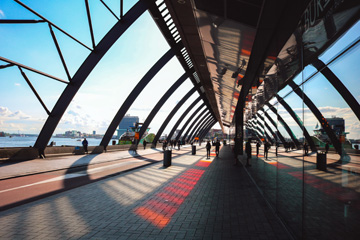Most civil court proceedings in the Netherlands begin when a writ of summons (in Dutch “dagvaarding”) is delivered by a Dutch bailiff (in Dutch: “deurwaarder”) to a defendant and served upon them, known as service of process. This summons states that they are summoned to appear at court at an appointed date and time. The defendant will answer this writ of summons by a statement of defense (in Dutch: “Conclusie van Antwoord”). Our Dutch attorneys in the Netherlands are specialized in Dutch procedural law and are experts when it comes to court proceedings in the Netherlands. Our Dutch lawyers can assist you both in analysing the facts of the case and any existing contracts and other agreements, and in issuing the summons on your behalf. We represent your interests in the Netherlands, both in court and before the Chamber of Commerce in Amsterdam. In what follows, our litigation attorney in the Netherlands explain the procedure and duration of legal proceedings in the Netherlands.
Dutch law provides that the losing party pays the costs of procedure including the legal costs of the winning party. In this respect it must be noted that the costs of procedure are not the actual expenses made; the amount of the procedural costs to be paid consists of lump sums, which are determined by the court in the judgment. Under Dutch law, there is no separate procedure for determining the costs of procedure and there is no law on the remuneration of lawyers.
In comparison to other countries, especially those with common law systems, court fees in the Netherlands are moderate. Especially in proceedings involving higher amounts in dispute, court costs are relatively low. The maximum rate of court costs in civil proceedings in the Netherlands is already reached for an amount in dispute of EUR 100,000. Therefore, under Dutch law, the same court costs would in principle be due for an amount in dispute of EUR 100,010 as for an amount in dispute of EUR 1 million.
Nonetheless it must be noted that the court costs for specific chambers differ. For example, the costs for proceedings before the Netherlands Commercial Court are higher than those for other courts. Yet, from an international perspective they are still moderate.
The system of civil court proceedings in The Netherlands
As said before, civil cases in the Netherlands begin with the plaintiff’s writ of summons (dagvaarding), which are followed by the statement of defence (in Dutch: Conclusie van Antwoord), possibly with a counterclaim (eis in reconventie). If parties cannot arrive to a settlement, a case continues in court with the oral hearing or pleading (in Dutch: comparitie or pleidooi) and is concluded with the court’s judgment (vonnis). In the Netherlands, civil main proceedings at first instance take place before one of the ten district courts in the Netherlands. On behalf of a Dutch lawyer (advocaat), a bailiff serves writ of summons to the defendant and sends a copy to the court in question. The writ of summons contains the claim, the grounds for the claim as well as evidence and, lastly, a date for the oral hearing. Depending on the amount and nature of the claim, the defendant may appear in person at the court hearing, or be represented by an authorized representative, which usually would be a Dutch lawyer (attorney at law, advocaat).
Duration of civil proceedings in The Netherlands
Statistically, about 70% of all civil proceedings in the Netherlands are decided at first instance in less than 12 months, and approximately 90% are decided within 24 months. It is interesting to note that in the Netherlands, statistically, 10 to 15 % of all first instance judgments in civil cases are appealed. Less than 50 % of the appeal cases are decided within 12 months. Approximately 80 % of all appeals are concluded within 24 months. Cases before the Dutch Supreme Court take an average of 24 months. The Amsterdam District Court is running a pilot of a faster procedure in simple cases where the examination of witnesses or expert evidence is not necessary. The procedure is similar to a procedure in interim relief, however it leads to a final decision. In these cases, the oral hearing usually takes place within six to ten weeks after the start of the proceedings. However, it should be noted that such a fast procedure is only possible if both parties agree or consent to it.
Dutch court proceedings – control by parties
A question that is often asked to the specialized lawyers of MAAK Advocaten is to what extent the parties in Dutch civil proceedings can control or influence the course of proceedings or their time schedule. The answer is that to a certain extent and only in exceptional cases, parties can control the timing of Dutch court proceedings, provided that they agree to deviate from the set deadlines or the normal course of such proceedings. The experience of our Dutch lawyers is that especially in complex procedures it can be a good option to deviate from the ordinary time limits after consultation with the court. As a rule, a party is given a period of four or six weeks to file a pleading with the court. In Dutch court proceedings at a district court, a first extension is granted only with the consent of the opposing party. A second extension requires good cause or force majeure – therefore, such a second extension is exceptional.
Dutch evidence law
Below, our specialized Dutch lawyers explain the questions of how Dutch evidence law is structured, whether there is a duty to preserve documents and other evidence until the trial, and whether the parties are obligated to exchange relevant documents or to make such documents available to the opposing party.
In Dutch legal proceedings in the Netherlands, parties are generally obligated to truthfully submit to the court all relevant facts and evidence explaining and proving their positions, as well as disproving the positions of the opposing party. However, it should be noted that this obligation differs from disclosure obligations that exist in common law jurisdictions. As a main principle, Dutch procedural law requires that the party taking certain positions must also prove them. There are, however, exceptions and nuances to this main rule. Our specialized lawyers are more than happy to inform you about those exceptions and nuances.
Either the request of a party or on their own motion (ex officio), the court may order a party to submit (further) documents or evidence in the possession of that party. The party confronted with such an order may refuse to submit such documents or evidence to the court for compelling reasons. However, the hurdle to successfully refuse to comply with such an order is rather high and it is not easy for a reason to qualify as ‘compelling’.
Under Dutch law there is no general obligation to retain documents or other evidence until the hearing. The production of evidence remains the responsibility of each separate party. A demand for general disclosure by the opposing party is not possible under Dutch law. An exception to this rule is Article 843a of the Code of Civil Procedure, which allows a party to request access to specific documents. However, the exception is subject to a number of conditions, about which our specialized lawyers can inform you.
Further, for a request for inspection, certain evidence or documents can also be seized provisionally. A party can apply to the court for such an attachment. After approval, a Dutch bailiff will seize and retain the relevant documents until the court has ruled on the request for inspection by the seizing party.
In the Netherlands, the term “contempt of court” does not exist, but the court may draw conclusions that are detrimental to the party who fails to comply with the obligation to provide relevant facts fully and truthfully, or in the event of destruction of evidence or withholding of evidence.
According to the Dutch Supreme Court, evidence, documents, and records in English, French and German may be presented as evidence to the court without translation. Nevertheless, the court may order a translation.
Litigation attorneys in The Netherlands
In Dutch court proceedings involving a foreign party, the question is often raised whether certain documents are protected against access by the opposing party, or whether an obligation to disclose them can be imposed. Under Dutch law, due to the relationship of trust and attorney-client privilege, a litigation lawyer in the Netherlands cannot be compelled to disclose information or documents received from his client, unless it concerns advice of an in-house lawyer. The protection of documents in Dutch civil procedure is therefore not linked to specific documents, but to the capacity of the lawyer – that is: whether the lawyer is an external attorney at law or an in-house lawyer. The party itself may invoke the confidentiality of the advice as one of the compelling reasons preventing disclosure after an order by the court. Note that correspondence between Dutch lawyers which was not a part of settlement negotiations or which falls within the scope of a confidentiality agreement can be introduced as evidence in legal proceedings in the Netherlands.
The role of judges in Dutch civil proceedings
To ensure independence of the judiciary, in the Netherlands professional judges are appointed as lifetime civil servants. A basic principle of the Dutch Code of Civil Procedure is that judges adopt a passive attitude in legal proceedings in the Netherlands, especially regarding fact-finding and defining the boundaries of the dispute and the legal debate. These issues typically fall within the scope of party autonomy, which originally is a guiding principle in Dutch litigation. However, nowadays there is a tendency towards a more active role for judges. This is reflected, amongst other things, in recent legislative initiatives that accommodate judges with more competences with respect to the taking of evidence, working towards settlement or mediation, as well as in the handling of civil court proceedings in the Netherlands proceedings.







